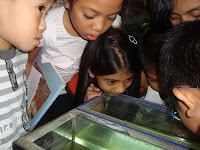Living with Nature - School on Blog
Paaralang Bayan sa Himpapawid (People's School-on-Air)
with Ms Melly C Tenorio
with Ms Melly C Tenorio
738 DZRB AM Band, 8 to 9 Evening Class, Monday to Friday
Glass aquarium at home
I loved watching the guppies in an old fashioned aquarium
sans any gadget for lighting, filter, and fancy screen;
the sun, the provider of food and oxygen through the algae
clinging on rock, and snails living off the glass clean.
I was a kid then eager to discover the mysteries of nature;
a little of Darwin, Linnaeus, and Arthur Doyle I sought,
a little of Darwin, Linnaeus, and Arthur Doyle I sought,
of Fleming's serendipity and Leeuwenhoek's microscopy,
seeing their images in an aquarium my father bought.
It was schooling, experimenting, and above all, dreaming,
it took me to a little Smithsonian, to a niche in biology,
archive of living history, the microcosm of the living world,
Microscopic community nestles on the alga. It is made up of protists living in a complex interrelationship, and interaction of energy and matter, in dynamic balance.
Characteristics of a Natural Aquarium
- A natural aquarium is a miniature pond, lake, or sea.
- The basic principle is conversion of the sun's energy into food and oxygen by algae and plants (photosynthesizers).
- Food and oxygen are important to fish and other animals.
- In return, the animals give off "waste" as nutrients and carbon dioxide important to plants.
- A natural aquarium therefore is a simple ecosystem, balanced environment.
- Like any ecosystem, its balance depends on healthy interrelationship of the living and non-living world.
- The organisms are classified into producers (plants, algae), and consumers (fish, snails), and decomposers (bacteria)
- Balance is dynamic, it changes, but nature guides it to attain stability or homeostasis.
- Energy flow goes through the food chain, food web, food pyramid.
- Humans are part of this system, and has assumed dominance over other organisms.
- Nature takes care of itself even without man. Thus, forests, coral reefs, and the like, are best maintained without man's intervention.
- On the other hand it is man that may destroy this natural balance through pollution, over fishing chemical farming, deforestation - and global warming, which is a consequence of man's increasing number and affluence. ~










No comments:
Post a Comment